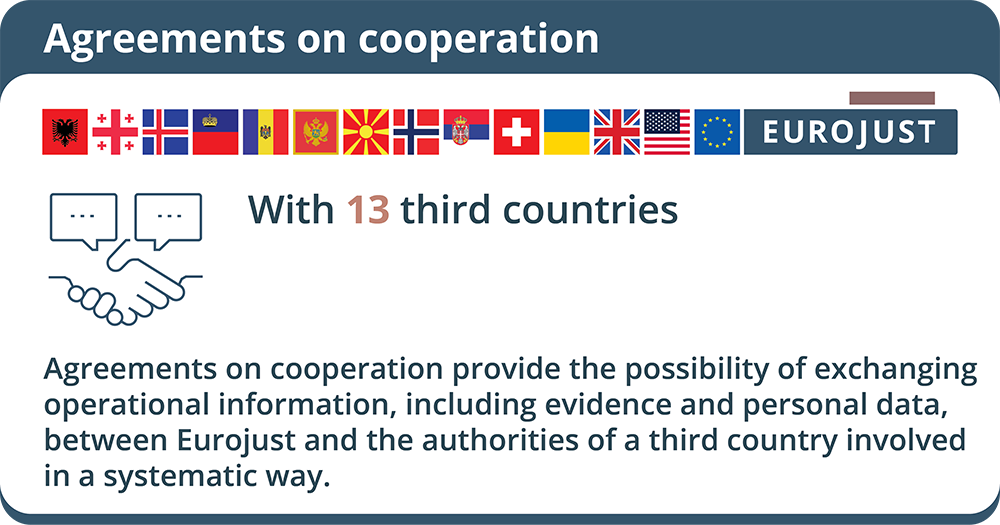International agreements on cooperation are concluded by the Council of the EU pursuant to Article 218 TFEU. They are negotiated by the European Commission following authorisation by the Council. They allow Eurojust to cooperate closely and exchange personal data with competent authorities of selected third countries, as they guarantee that adequate safeguards are in place with respect to the protection of personal data of individuals.
International agreements also allow third countries to post a Liaison Prosecutor at Eurojust.
International agreements in place
An international agreement between the EU and the United Kingdom includes specific provisions on cooperation with Eurojust.
International agreements for the future
A Council Decision authorising the opening of negotiations for Agreements between the European Union and Algeria, Armenia, Bosnia and Herzegovina, Egypt, Israel, Jordan, Lebanon, Morocco, Tunisia and Türkiye on cooperation between Eurojust and the competent authorities for judicial cooperation in criminal matters of those third States was issued on 1 March 2021.
On this basis, the European Commission and representatives of several countries have carried out negotiations, and international agreements have been signed:
- with Armenia on 5 April 2024
- with Bosnia and Herzegovina on 24 October 2024
- with Lebanon on 2 December 2025
While some of the above agreements have entered into force, they are not yet applicable, as conditions stemming from the agreement have yet to be fulfilled
Negotiations are ongoing with several other countries.
Implementing Working Arrangements
In order to implement relevant provisions of the international agreements concluded by the EU and third countries, Eurojust concludes Working Arrangements with the relevant authorities of the countries concerned, to set out a more detailed cooperation framework. Having an implementing Working Arrangement in place is usually necessary for international agreements to become applicable.
Such an arrangement has been concluded with the authorities of the United Kingdom.
Eurojust also concluded an implementing Working Arrangement with Armenia, this however is not yet in force.
 Agreements on cooperation with Eurojust enable the Agency to consolidate its partnerships with third countries and international organisations, bringing them and Member States closer together in the fight against serious cross-border crime. Stronger links between judicial actors inside and outside the EU make life more difficult for organised crime groups, terrorists and other criminals operating across borders, by aligning working practices and strategies and strengthening judicial cooperation and mutual trust.
Agreements on cooperation with Eurojust enable the Agency to consolidate its partnerships with third countries and international organisations, bringing them and Member States closer together in the fight against serious cross-border crime. Stronger links between judicial actors inside and outside the EU make life more difficult for organised crime groups, terrorists and other criminals operating across borders, by aligning working practices and strategies and strengthening judicial cooperation and mutual trust.